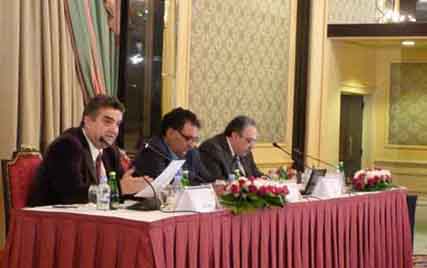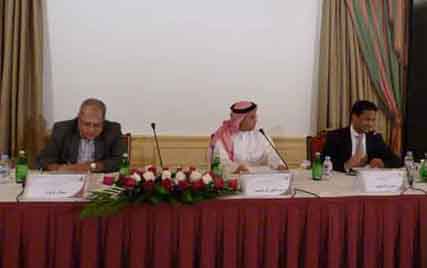Although several Arab countries, such as Lebanon, have long featured societies with complex sectarian structures, the recent surge of popular revolts in what has become known as the Arab Spring has brought relations among the region's various religious/sectarian communities to the fore of public attention. As part of its efforts to facilitate and contribute to Arab intellectual debate on issues of critical importance, the Arab Center for Research and Policy Studies (ACRPS) organized and hosted an academic symposium to address these tensions.
Titled "The Arab Revolutions and Democracy: The Roots of the Sectarian Divide and the Means to Address It", the event was held at the Ritz-Carlton Hotel in Doha on January 28, 2012, the meeting attracted considerable interest from intellectuals based in several Arab countries, including Egypt, Lebanon, and Qatar. The aim of the meeting was to hold open discussions on the historical roots of the sectarian realities prevalent in Arab countries, and the intellectual contexts in which they are understood; it also delved into the inherent contradiction between societies divided by sectarian tensions and the need to establish sovereign, democratic states.

The plenary session was opened by Dr. Azmi Bishara, the general director of the ACRPS, who laid the groundwork for the remainder of the event by detailing how the concept of sectarianism came to be shaped in the discourse of the Arab and Islamic worlds. According to Dr. Bishara, the very concept of sectarianism (i.e. of treating citizens in accordance with their sectarian affiliations) - be it an affiliation to a sect within a religious group, such as happens in Iraq, or sects divided by a larger confessional divide, as in Lebanonposes an inherent threat to the idea of a state which is both a state for all of its citizens and capable of maintaining its own integrity. Dr. Bishara stressed that the kind of sectarian pluralism often found in Arab societies - and has historically been more pronounced than sectarian pluralism found in Western societies - is not in any way to be confused with the idea of pluralism in a democratic context (which is a claim often made by defenders of the Lebanese confessionalist system ): in democratic systems, membership of civic groups is by choice, something which is not an option in a sectarian context. Dr. Bishara further elaborated on the inherently modern and secular nature of the idea of codified sectarianism in politics: in this sense, one could see that religious extremism and the desire to establish strict sectarian divisions within a country were the result of the imposition of a modern social structure on pre-modern systems of belief. Dr. Bishara described how this foreign-imposed approach threatened to engulf the entire region, giving the example of the American invasion of Iraq in 2003, which set the stakes for one of the Arab region's most decidedly sectarian electoral systems. "The crime which L. Paul Bremer [the first US-appointed governor of the Coalition Provisional Authority in Iraq] committed was no small matter" he said. "He ensured that Iraq would see a sectarian divide [which was avoidable]".
Dr. Bishara's comments were followed by those of the other speakers on the first panel, Dr. Wajih Kanso of Lebanon and Samir Murqus of Egypt.
Dr. Kanso, a professor of Muslim-Christian relations at Lebanon's Jesuit-founded Université Saint-Joseph (USJ), was uniquely well-placed to discuss detailed aspects of how sectarianism actually plays out in day-to-day life. He made special reference to the matter of inter-confessional marriages in Lebanon, which can present severe difficulties for the people involved, and often compel the parties to obtain a civil marriage in a foreign country (usually Cyprus) before their union can be recognized in their homeland. Dr. Kanso also spent some time explaining how the political lexicon had to be adapted in order to prepare public opinion for the demands of a sectarian system, building on a tribal, composite makeup of the state which dates back to the earliest centuries of Arab history. This, he said, played a role in allowing for the proliferation of non-state actors born out of the weakness of the central state in relation to sectarian groupings. Dr. Kanso enumerated several negative side-effects of a sectarian political system like Lebanon's, including the phenomena known as "honor crimes" and the forceful imposition of religious laws. Despite the obstacles thrown up by such a complex and invasive system for managing the personal affairs of the populace, Kanso remained optimistic about the prospects for change. He said the revolutions of the Arab Spring had the potential to change the "consciousness" of the people they affected, and therefore held out hope for the possibility that these momentous political changes would not just revolutionize the power structures in Arab countries, but also usher in a new era of inter-communal relations.
The third and final speaker of the plenary session was Samir Murqus, the deputy mayor of Cairo, who related his first-hand experience of how the wildly popular and successful Egyptian revolution influenced the often shaky relations between his city's Muslim and Coptic Christian communities. In a lecture titled "The January 25 Revolution: National Struggle and Religious Conflict", Murqus noted the sporadic incidents of sectarian tension spilling over into violence between Egypt's two main religious groups, including the infamous Maspero incident. Despite these, Murqus maintained, Egyptians were positive about the chance of a more harmonious future. It was during the reign of President Anwar Sadat, he said that the Egyptian state began to deal with its Coptic Christian citizens as, first and foremost, Coptic Christians, choosing to create channels of communication through their ecclesiastical structures. With the former regime out of the way, he argued, Egyptian Copts could now look forward to fuller civic partnership in their country's affairs. While nobody was promising that this would be an easy transition, Murqus added, Egyptian Copts had already made it a reality, having chosen to join their Muslim compatriots without waiting for the approval, or otherwise, of the Coptic Church. This is part of the same mass movement, he said, which is gathering all Egyptians - men and women, rich and poor -around the same goals. These trends he tied together, highlighting the importance of establishing a balance between stable governance and social justice if Egypt is to enjoy a peaceful existence.
These opening papers were followed by a brief question-and-answer session, brought to an end by a well-received comment from ACRPS contributor Dr. Bassem Sarhan. He warned that one of the factors which would make it very difficult to comprehensively address sectarian tensions within Arab states was the fact that young children were being indoctrinated, if subtly, into a sectarian mindset. Citing the common example of youngsters bringing sectarian biases home from school, Dr. Sarhan suggested their families should intervene.

The second session, which focused on history, was opened by Qatari author Abdulaziz Al Mahmoud, author of the historical fiction novel The Pirate and former editor of Qatar's Al-Arabi daily. The first speaker, ACRPS researcher Dr. Jamal Barout, spoke of the role of French interference in creating heightened sectarian identities in Greater Syria. Dr. Barout spoke of how French expansion into Greater Syria (which coincided with the rapid modernization of the economy, particularly the silk industry, in places like Mount Lebanon) went hand-in-hand with efforts to codify and entrench distinct identities for different communities, exacerbating differences which had already existed. As an example of this, he cited the French insistence that Druze and Alawite communities in what was to become Syria be recognized as distinctly non-Muslim - in some cases, against their own wishes and those of their (variegated) community leaderships. This, he said, was an example of how a sectarian political system did not really come to reflect any level of religious diversity within the community, but rather was an attempt by the colonial authorities to find ways of controlling and manipulating the people of modern-day Syria and Lebanon. This helped to bolster feelings of loyalty to sectarian formations within society, which had previously existed within a less rigid environment, one in which there was constant interaction between all of the religious communities in Greater Syria, although this was limited by the Turkish millet system. These colonial policies served as the cornerstone for the "creation of a false consciousness" among people in Syria, leading to what Dr. Barout and others at the meeting, notably Dr. Bishara, call the "formation of national identities", in Arabic Umma (broadly, "nation"; see Ali Abdulrazak's idea of the "nationalization" of religion, and also Benedict Anderson's Imagined Communities).
The final speaker addressed questions of a directly historical nature, using broad and deep knowledge of the historical corpus of Islamic civilizations in the Fertile Crescent to support his idea idea that the great Sunni-Shia divide was entirely without theological justification or historical legitimacy. Dr. Mohammed Al Shenqeeti, a Mauritanian lecturer at Qatar's Faculty of Islamic Studies, dispelled common misconceptions, often echoed in the context of the over-arching Arab-Persian dispute, of long-standing enmity between Shia and Sunni Muslims along both coasts of the Gulf. While medieval Muslim history was witness to numerous unfortunate episodes, particularly in terms of clashes and populations across different districts within Baghdad, there was no real theological or religious significance to these, save that people had wanted to impose such an interpretation on what had been political disputes. The desire to inflate what were otherwise trifling theological disagreements into insurmountable conflicts over religion and community space was part of the process touched upon throughout the conference: that of creating a "false consciousness" and needless dividing barriers which did not serve the greater good.